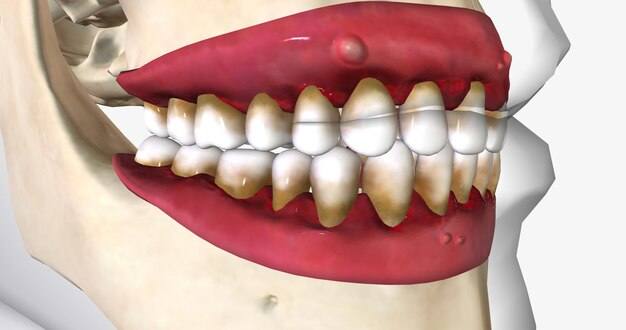What organs are affected by periodontal disease? Periodontal disease, commonly known as gum disease, is not just a threat to oral health but can also have significant implications for overall systemic health. This article explores the various organs and systems in the body that can be affected by periodontal disease, highlighting the importance of oral hygiene and regular dental care in maintaining overall health.
Understanding Periodontal Disease
Periodontal disease is a chronic inflammatory condition that affects the gums and supporting structures of the teeth. It typically begins with gingivitis, characterized by red, swollen gums that may bleed easily. Without proper treatment, gingivitis can progress to periodontitis, where the inflammation spreads deeper into the gums and can lead to tooth loss.
Can Periodontal Disease Affect Your Whole Body?
Yes, periodontal disease can affect your whole body. Research has established a clear link between periodontal disease and various systemic conditions. The mouth serves as a gateway to the body, and bacteria from infected gums can enter the bloodstream, potentially affecting different organs and systems.
SEE ALSO: Can Deep Cleaning Cure Periodontal Disease
Which Body Systems Are Most Affected by Dental Disease?
The body systems most commonly affected by dental disease include:
- Cardiovascular System
- Respiratory System
- Endocrine System
- Digestive System
- Skeletal System
- Nervous System
Cardiovascular System
One of the most researched links is between periodontal disease and cardiovascular health. Studies have suggested that the inflammation and bacteria associated with gum disease might contribute to heart disease, stroke, and endocarditis. The exact mechanisms are still being studied, but it’s believed that bacteria from the mouth can cause inflammation in the blood vessels and contribute to the formation of arterial plaques.
Key Points:
Periodontal disease may increase the risk of atherosclerosis (hardening of the arteries).
Bacteria from the mouth can enter the bloodstream and cause inflammation in the blood vessels.
This inflammation can lead to the formation of clots, increasing the risk of heart attacks and strokes.
Respiratory System
Periodontal disease has also been linked to respiratory infections and conditions such as pneumonia. Inhalation of oral pathogens or aspiration of bacteria from the mouth can lead to infections in the lungs, particularly in individuals with compromised immune systems or underlying respiratory conditions.
Key Points:
Bacteria from gum disease can be inhaled into the lungs.
This can cause respiratory infections, including pneumonia and chronic obstructive pulmonary disease (COPD).
Individuals with existing respiratory conditions are at higher risk.
Endocrine System (Diabetes)
People with diabetes are more susceptible to infections, including periodontal disease. Conversely, gum disease can make it harder to control blood sugar levels, leading to complications in diabetes management. Treating and controlling gum disease is crucial for overall diabetes care.
Key Points:
Periodontal disease can make blood sugar control more difficult.
This can lead to a vicious cycle, as high blood sugar can also increase the risk of gum disease.
Managing periodontal disease is essential for effective diabetes control.
Reproductive System (Pregnancy)
Pregnant women with periodontal disease may be at higher risk of complications such as premature birth and low birth weight. The inflammatory response triggered by gum disease can potentially affect the developing fetus, highlighting the importance of prenatal dental care.
Key Points:
Inflammation from gum disease can affect pregnancy outcomes.
Risks include premature birth and low birth weight.
Pregnant women should maintain good oral hygiene and seek regular dental care.
Digestive System
While less studied than other connections, there is evidence to suggest that periodontal disease may contribute to digestive disorders.
Bacteria swallowed from infected gums can potentially affect the gastrointestinal tract, though more research is needed to establish clear links.
Key Points:
Bacteria from periodontal disease can be swallowed and affect the digestive system.
There may be a link between gum disease and conditions such as irritable bowel syndrome (IBS) and inflammatory bowel disease (IBD).
More research is needed to fully understand these connections.
Skeletal System (Osteoporosis)
Some studies have explored the relationship between gum disease and osteoporosis. Chronic inflammation in periodontal disease may lead to bone loss, and individuals with osteoporosis may be more susceptible to periodontal disease.
Key Points:
There may be a link between periodontal disease and bone health.
Individuals with osteoporosis may be at higher risk of gum disease.
Maintaining bone health is important for overall dental health.
Nervous System (Cognitive Function)
Recent research has also suggested a potential link between periodontal disease and cognitive decline in older adults. Chronic inflammation from gum disease may contribute to cognitive impairment and increase the risk of conditions like Alzheimer’s disease.
Key Points:
Chronic inflammation from gum disease may affect brain health.
There is a potential link between periodontal disease and cognitive decline.
More research is needed to understand this connection fully.
What Health Problems Can Periodontitis Cause?
Periodontitis can cause a wide range of health problems, including:
- Heart disease and stroke
- Respiratory infections
- Complications in diabetes management
- Pregnancy complications
- Digestive disorders
- Bone loss and osteoporosis
- Cognitive decline and Alzheimer’s disease
Conclusion
In conclusion, periodontal disease is not just a dental issue but a significant risk factor for various systemic conditions affecting different organs and systems in the body. Maintaining good oral hygiene, regular dental check-ups, and prompt treatment of gum disease are essential not only for preserving oral health but also for reducing the risk of complications in overall systemic health.
By understanding the connections between oral health and systemic health, individuals can take proactive steps to protect both their smiles and their overall well-being. Consulting with a dental professional for personalized oral health care is crucial in managing and preventing periodontal disease and its potential systemic effects.

